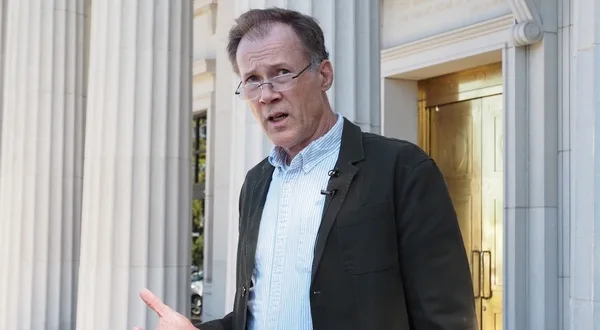
During a press conference outside of the Arkansas Supreme Court, Hans Stiritz, spokesperson for Local Voters in Charge, speaks about the court’s decision to certify a proposed casino constitutional amendment for the ballot on Oct. 17, 2024. (Mary Hennigan/Arkansas Advocate)
Votes cast on a proposed ballot measure that would repeal a Pope County casino license and require countywide special elections for any new casinos built in Arkansas will count, the state Supreme Court ruled Thursday.
In a majority opinion authored by Justice Karen Baker, the court found the popular name and ballot title were sufficient. Earlier this week, the court also found the signature collection of ballot question committee Local Voters in Charge was appropriate.
“In sum, we hold that the popular name and ballot title are an intelligible, honest, and impartial means of presenting the proposed amendment to the people for their consideration,” said Baker, writing for the majority. “We hold that it is an adequate and fair representation without misleading tendencies or partisan coloring.”
The popular name and ballot title of a proposed ballot measure must be approved by the Arkansas attorney general before the signature collection process can begin. While the ballot title is intended to give voters a fair understanding of the issues without including misleading information or omitting relevant information, the popular name is more succinct and serves as a way to identify the proposal in discussion.
Thursday’s decision addressed the popular name and ballot title’s content regarding sufficient information, the revocation of an existing casino license, the proposal’s potential effect on future constitutional amendments, how the title comports with the text of the proposed amendment and potential conflicts with federal law.
Justice Rhonda Wood concurred, though she said she partially agreed with both the majority and the dissent. Justice Shawn Womack dissented.
In his dissent, Womack said the popular name and ballot title were misleading to voters by not revealing existing information about the Pope County casino license.
“…Neither the popular name nor the ballot title contemplates revoking an already existing license that has been issued by the Arkansas Racing Commission,” Womack wrote. “Indeed, both use future tense language indicating that the vote will affect action taken prospectively without revealing to voters that a vote in favor of the amendment will, in fact, repeal action that has already been taken prior to any votes being cast.”
The Arkansas Racing Commission issued the Pope County casino license to Cherokee Nation Entertainment in June. Gulfside Casino Partnership, another license applicant, filed a lawsuit in July challenging the commission’s decision. The litigation is still pending.
Cherokee Nation Businesses, an affiliated organization, has donated to Investing in Arkansas, a group that opposed the anti-casino ballot measure.
Early voting in Arkansas starts Monday, and the fate of the votes cast on the anti-casino proposed constitutional amendment has been up in the air since a group challenged the signature collection efforts and the popular name and ballot title.
Arkansas Canvassing Compliance Committee, a group with members involved in the Pope County casino license dispute, filed a petition with the state Supreme Court one day after Secretary of State John Thurston certified the amendment for the ballot based on an adequate number of signatures.
During a hearing in August before Special Master Randy Wright, ACCC’s attorneys argued that the ballot question committee Local Voters in Charge illegally financially incentivized its canvassers and hired out-of-state residents to collect signatures. Thurston, through counsel with the attorney general’s office, also argued that all signatures collected should be disqualified because an agent signed required paperwork in place of a sponsor.
The high court ruled earlier this week that the agents who signed for Local Voters in Charge did so appropriately, and there was not enough evidence to prove other claims about the group’s signature collection. The court took a report from Wright into consideration when making its decision.
Wright also found nearly 6,000 signatures collected should be thrown out due to insufficient addresses, but Local Voters in Charge still exceeded the 90,704 signatures required for proposed constitutional amendments to qualify for the ballot.
“We know Arkansans will reject this sneaky amendment,” said Allison Burum, a spokesperson for a group that challenged the proposal. “It is important for voters to know that Issue 2 is the only thing standing in our way of breaking ground on the $300M Legends Resort & Casino near Russellville, an economic development super project that is licensed, county-approved, and bringing 1,000 jobs and millions in new tax revenue. Vote against Issue 2.”
During a press conference held outside the Arkansas Supreme Court building after the decision, Local Voters in Charge Spokesperson Hans Stiritz praised the court’s decision and said the opposition has raised confusion about the amendment’s intention.
“It’s about respecting the rights of local citizens to determine the character of their own community, especially when it comes to casinos,” Stiritz said.
With early voting a few days away, Stiritz said the ballot question committee will continue urging their message that the local population should make decisions for communities instead of gambling lobbyists or politicians.
“If a community says at the voter level that ‘We don’t want this,’ it shouldn’t be forced on them by a statewide policy or statewide vote,” he said.
Stiritz did not have a comment on details of the dissenting opinion, though he said the affirmative was strong and challenging language that was previously approved by the attorney general’s office was “reaching.”
To view this story, or more news updates from Arkansas Advocate, click here.
WebReadyTM Powered by WireReady® NSI










